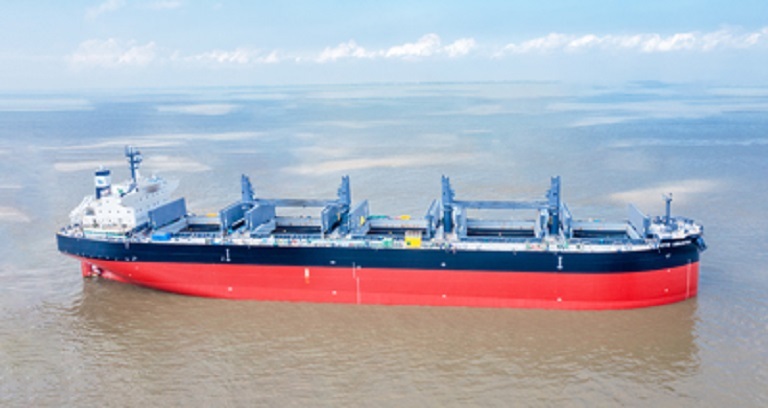Kawasaki Heavy Industries, Ltd. announced on Monday (Aug22) that it delivered the bulk carrier ETG UBUNTU, with a capacity of 64,000 DWT (Kawasaki hull No. 8087, NACKS hull No. 403), for EIGHT RIVER SHIPPING S.A. at Nantong COSCO KHI Ship Engineering Co., Ltd. (NACKS), which is located in Nantong City, China and operated jointly with China COSCO Shipping Corporation Limited (China COSCO Shipping).

Principal particulars and features of the vessel are as described below.
Principal Particulars
| Length overall | 199.90 m |
| Molded breadth | 32.24 m |
| Molded depth | 19.40 m |
| Molded draft | 13.50 m |
| Gross tonnage | 36,412 T |
| Deadweight | 64,195 t |
| Hold capacity | 81,432 m3 |
| Main engine | One set of MAN B&W 6S50ME-C9.7 diesel engine |
| Speed | Approx. 13.8 knots |
| Complement | 25 people |
| Classification | Nippon Kaiji Kyokai (ClassNK) |
| Country of registration | Panama |
Features:
- The vessel has a flush deck with a forecastle and five holds that are designed for optimum transport of grains, coal and the other products. Four 30-ton deck cranes are installed along the center in between the hatch covers to enable cargo loading and unloading in ports that lack cargo handling facilities.
- The vessel employs various technologies to achieve maximum fuel economy, including an energy-saving, electronically-controlled main diesel engine, high propulsive efficiency propellers, and the Kawasaki rudder bulb system with fins (RBS-F) and semi-duct system with contra fins (SDS-F), which meets the IMO’s Energy Efficiency Design Index (EEDI)*1 Phase 3 regulations (30% reduction in CO2 emissions from the baseline).
*1 Energy Efficiency Design Index (EEDI) regulation: An international regulation that enforces compliance of newly-constructed vessels with energy-saving performance regulation values using the Energy Efficiency Design Index (EEDI), which is defined as the number of grams of CO2 emitted when transporting one ton of cargo over one mile. Required EEDI regulation values are made stricter in phases according to the construction contract and delivery dates. For bulk carriers, compliance with Phase 2 set in 2013 (20% reduction in CO2 emissions from the baseline [Phase 0]) is required for vessels contracted for construction in 2020 and later. In addition, compliance with Phase 3 (30% reduction in CO2 emissions from the baseline [Phase 0]) is required for vessels contracted for construction in 2025 and later.